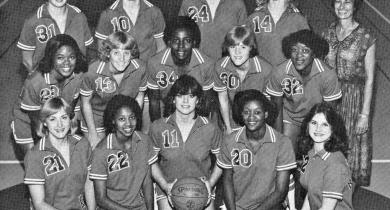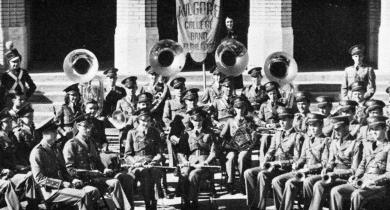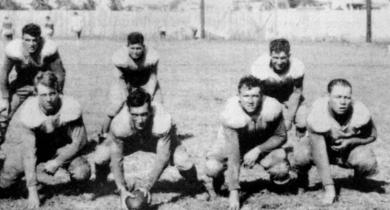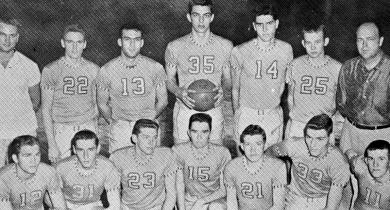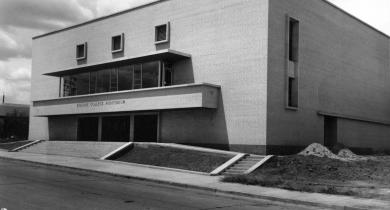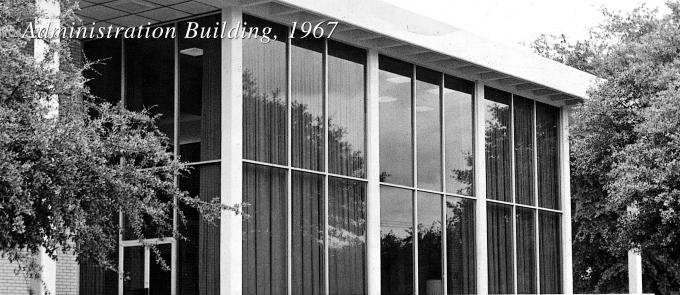C.M. “Buck” Kilgore, whose family first settled in nearby Danville, founded the town of Kilgore (Texas) in 1872. When the International and Great Northern Railroad came to East Texas and located its terminal four miles west Danville, Mr. Kilgore realized the advantages of living near the railroad and moved his family to a new home near the depot located in present-day Kilgore.
As time went by, many from the Danville area migrated to the new settlement; and by 1880, the town had a population of 300 with a hospital, drugstore, depot, two mercantile stores, five dry goods stores, several nice homes, eight saloons and a commitment to education.
In 1873, Professor Isaac Alexander, a prominent educator, established the Alexander Institute in Kilgore and operated a very successful educational institution until it was moved in 1894 to Jacksonville, Texas, where it became Lon Morris College. Gregg County made its first serious attempt at a uniform school system in 1893 by dividing the county into eleven districts. By 1912, the Kilgore School District was a better-than-average school district in the state with an area of 25 square miles and an enrollment of 125 students.
The normal, everyday life of the Kilgore community was dramatically altered on December 28, 1930, when the Lou Della Crim #1 came in with more than 20,000 barrels of crude oil per day. The boom was on! Derricks sprang up everywhere, and the town grew from a population of 800 to 15,000 in a matter of months. The city was formally incorporated in February of 1931. Kilgore civic and business leaders realized that the best oil resources now made it possible to pursue what had earlier been an impossible dream. They envisioned a new service for the young people of the area, one that would have long-range effects on every community in East Texas. They would establish a community college.
W. L. Dodson, superintendent of the Kilgore Independent School District, urged the board to take the necessary steps to create a junior college; and they authorized him to bring in B. E. Masters, president of Amarillo Junior College, to assist in the actual implementation of the plan. Mr. Masters came in April of 1935 and met with the board of education. In August, the board formally named Mr. Dodson as president with Mr. Masters as dean. In order to begin classroom instruction by fall, all parties concerned agreed that the college should be operated by the Kilgore Independent School District and would temporarily utilize the public school facilities. Thus, Kilgore College opened in the fall of 1935 with 11 faculty members and 229 students.
In 1946, the Board of Trustees of the Kilgore Independent School District issued invitations to neighboring common and independent school districts, inviting them to join a union district for junior college purposes. Seven districts—Sabine, White Oak, Leverett’s Chapel, London, Overton, Gaston, and Gladewater—have since joined the Kilgore College District. The college district is now directed by a board of trustees of nine members elected by the individual districts.
Kilgore College received recognition by the Southern Association of Secondary Schools and Colleges in 1936, and by 1940, had the largest enrollment of any public junior college in the South. In 1948, it was the second junior college in the nation in the number of transfers to senior colleges.
(History researched by Bonnie Durning and Doris Bolt, retired KC history instructors)
The college has maintained a center in Longview since 1976 and KC-Longview serves approximately 3,000 students annually.
For more than 30 years, KC-Longview has grown into a comprehensive educational location with classes for university transfer, workforce education, lifelong learning, and adult education and literacy, including preparation for the Certificate of High School Equivalency (GED). KC-Longview also offers an array of student services, including academic counseling, tutoring, testing, registrar, cashier and bookstore services. The location houses the following workforce education programs: Business – Business Computer Office Management, Cosmetology (including Nail Technology and Facial Specialist, Culinary Arts and Real Estate Agent; Industrial – Diesel Technology, HVAC-R (Heating, Ventilation, Air Conditioning & Refrigeration), and Industrial Maintenance Technology; and Health Care – Emergency Medical Services Professions, Nurse Aide and LVN (Licensed Vocational Nursing). KC-Longview is the region’s leading provider of emergency medical technicians (EMT) and paramedics, licensed vocational nurses (LVN) and certified nurse aides (CNA).
KC is an accredited public two-year community college that has met the academic and workforce needs of East Texas since 1935 by providing a learner-centered environment that focuses on student access, success and completion via collaborative partnerships. The college is led by Dr. Brenda S. Kays, president.
KC promotes great value, primarily for its 20-member school district service area in Northeast Texas, with a highly competitive cost. KC offers 138 academic majors, has an enrollment of more than 11,000 students (academic & CTE) and has 310 employees – 22 of whom have doctoral degrees.
In its 83-year history, more than 150,000 former students are proud to say they have benefited from a KC education. In addition to basic academic courses for transfer students, KC offers training in high-demand programs such as nursing, law enforcement, firefighting, EMT, culinary arts, process technology, welding, radiologic technology, physical therapy, automotive repair technology, auto body repair technology, process technology and industrial maintenance — as well as numerous other high-tech fields and certificate programs.
KC also has a vibrant Workforce Development-Continuing Education department that offers a wide array of courses for life-long learners as well as classes specifically designed for local businesses to help with specific industrial needs. The college also has an international student program, attracting students from around the world.
Athletic teams at KC compete in the National Junior College Athletic Association (NJCAA) at the Division I level. Athletics at KC include men’s/women’s basketball, football and women’s softball.
KC promotes easy access through open-door admission, distance learning opportunities, dual credit courses for high school students, developmental education and a comprehensive financial aid program.
